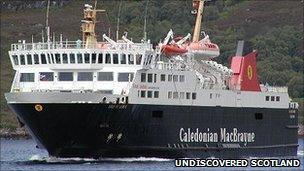Ferry row minister defends fares in the Western Isles
- Published

RET was launched as a three-year pilot project
Scottish Transport Minister Stewart Stevenson has defended the government's decision to extend cheap fares in the Western Isles at a cost of £6.5m.
Shetland Lib Dem MSP Tavish Scott had accused the government of ignoring the needs of the Northern Isles.
However, Mr Stevenson said the Western Isles needed the road equivalent tariff (RET) scheme due to lower wages and a falling population.
His comments coincided with the end of a ferries review consultation.
Mr Stevenson told BBC Radio Scotland that Shetland residents had weekly earnings that were on average £70 higher than in the Western Isles and in Orkney it was some £50 higher.
He added: "Over the last 20 years we've seen population in the Western Isles drop by 19%. We've seen population in the Northern Isles remain relatively stable.
"It is absolutely clear that investment in the Western Isles is investment to support the economy and the future of these islands.
"The Northern Isles have for a very long time had the support through fare structure for residents which the Western Isles has not had."
The Scottish government has increased support to Northern Isles ferries by 25% since last year to £36.2m.
Future plans
It has said that the extended RET scheme in the Western Isles was a pilot, which may pave the way for cheaper fares for all remote and island communities.
The government's Scottish Ferries Review, external - a consultation which ran from June until the end of September - aims to inform a draft ferries plan up to 2022.
This will outline how the government intends to fund and procure ferry services.
Earlier this month Mr Stevenson backed down on controversial plans to make £1m of savings to Northern Isles Ferry Service.
He said the cuts were no longer necessary because Northlink had found the savings from its running costs.
Lib Dem MSP for Orkney, Liam McArthur, said the SNP's latest statement on RET was "nonsense".
He said: "The minister's remarks show that he is all over the place on RET.
"The three-and-a-half year 'pilot' was originally justified as being needed to assess the impact of RET on island economies before it was rolled out across all island areas.
"But today he seems to have forgotten all about this. It's now all about the relative affluence of the islands."
- Published21 September 2010
- Published5 September 2010
- Published6 September 2010
- Published1 September 2010
- Published31 August 2010
- Published23 August 2010
- Published13 August 2010